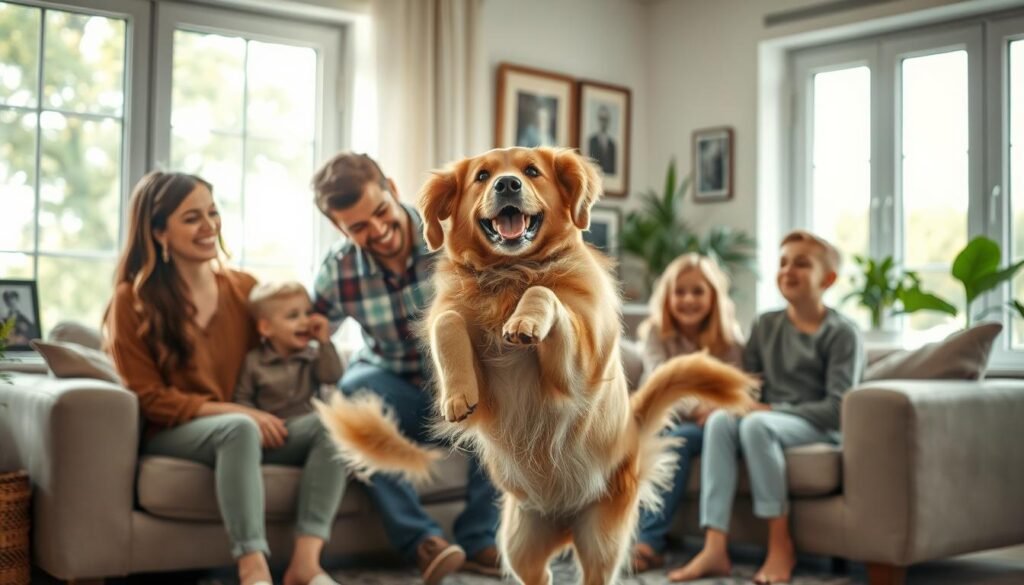For centuries, the debate over whether dogs or cats make the ideal companion has sparked countless discussions. Both pets bring unique qualities to a household, but when it comes to loyalty, trainability, and active lifestyles, dogs often take the lead. This article dives into the reasons many owners find dogs to be the superior choice.
Historically, dogs have been domesticated for their protective instincts and ability to form deep bonds with humans. Unlike cats, which are often seen as independent, dogs thrive on interaction and provide consistent attention. They encourage exercise through daily walks, benefiting both the person and the pet.
This article will explore the practical benefits of owning a dog, from their trainability to their role as guardians. Backed by research from The Spruce, we’ll break down the evidence to help you decide which pet suits your lifestyle best.
Key Takeaways
- Dogs are highly trainable and respond well to commands.
- Daily walks with dogs promote physical activity for owners.
- Dogs form strong bonds and provide consistent companionship.
- Historically, dogs have served as protectors and guardians.
- Research highlights the emotional and health benefits of owning a dog.
Overview: The Great Debate Between Dogs and Cats
Choosing between a dog and a cat is a decision many pet lovers face. Both animals have unique traits that make them beloved companions. Understanding their historical origins and natural behaviors can help owners decide which pet suits their lifestyle best.
Historical Origins and Evolution
Dogs were domesticated thousands of years ago, primarily for their protective instincts and ability to assist humans. They evolved from wolves, forming deep bonds with people. Cats, on the other hand, were valued for their independence and skill in controlling pests. Their domestication began in ancient Egypt, where they were revered as sacred animals.
Historically, dogs played a crucial role in farming and hunting. They were bred for loyalty and work, making them indispensable to early human societies. Cats, however, were often seen as solitary creatures, thriving in environments where they could roam freely.
Contrasting Natural Behaviors
Dogs are known for their social nature and eagerness to please. They thrive on interaction and often form strong bonds with their owners. Cats, by contrast, are more independent and self-reliant. While they can be affectionate, they prefer to set their own boundaries.
Dogs require regular exercise, such as daily walks, which benefits both the pet and the person. Cats, however, are more low-maintenance, often content with indoor play. These behavioral differences influence how each animal fits into a home.
| Aspect | Dog | Cat |
|---|---|---|
| Social Behavior | Highly social, thrives on interaction | Independent, sets own boundaries |
| Exercise Needs | Requires daily walks and play | Low-maintenance, enjoys indoor play |
| Historical Role | Protector, helper, and companion | Pest controller, revered in ancient cultures |
Exploring Why Are Dogs Better Than Cats

Loyalty and companionship are traits that set dogs apart from other pets. Their ability to form deep emotional bonds with their owners makes them exceptional companions. Unlike cats, which are often independent, dogs thrive on interaction and consistently show affection.
Unwavering Loyalty and Companionship
Dogs are known for their intense, lasting bonds with their owners. Studies show that 74% of dog owners consider their pets part of the family. This emotional connection is stronger than what most cat owners report. Dogs often greet their person with excitement, reinforcing their role as loyal companions.
Research from the American Veterinary Medical Association highlights that dogs help reduce stress and anxiety in 78% of cases. Their presence provides comfort and emotional support, making them ideal for families and individuals alike.
Superior Trainability and Protective Traits
One reason dog owners prefer their pets is their advanced trainability. Dogs can understand up to 165 words on average, with some breeds learning over 200. This responsiveness to commands makes them easier to train compared to cats.
Dogs also exhibit natural protective instincts. Homes with dogs are statistically less likely to be burgled. Their loyalty translates into active protection, whether guarding the house or alerting their owner to potential dangers.
| Aspect | Dog | Cat |
|---|---|---|
| Loyalty | Forms deep emotional bonds | More independent |
| Trainability | Learns up to 165+ words | Less responsive to commands |
| Protective Instincts | Natural guardians | Less likely to protect |
Health and Lifestyle Benefits of Dog Ownership

Owning a dog can transform your daily routine and improve your overall well-being. From promoting physical fitness to enhancing social interactions, the advantages of having a dog are both immediate and long-lasting. Unlike cats, which are often more sedentary, dogs encourage an active lifestyle that benefits both the person and the pet.
Staying Active with Daily Walks
One of the most significant benefits of owning a dog is the need for regular exercise. Daily walks not only keep your pet healthy but also ensure you stay active. Studies show that dog owners spend nearly 300 minutes each week walking, compared to just 100 minutes for non-owners.
This consistent activity can lead to improved cardiovascular health and lower stress levels. Research from the American Heart Association indicates that regular walk routines reduce the risk of diabetes and heart disease. For many, this makes a dog the perfect companion for maintaining a healthy lifestyle.
Enhanced Social Engagement
Dogs also play a vital role in boosting social interactions. Taking your pet to the park or participating in doggy playdates can help you meet new friends. Approximately 40% of dog owners report having an easier time connecting with others because of their pets.
This increased socialization can reduce feelings of loneliness and improve mental health. Whether it’s chatting with fellow dog owners or simply enjoying the outdoors, a dog can make your home feel more connected to the community.
Incorporating a dog into your life is a good way to stay active, social, and healthy. Start with daily walks and explore local parks to maximize the benefits for both you and your pet.
Practical Advantages of Dogs in the Home
Managing a pet at home can be simplified with the right choice of companion. Dogs, in particular, offer practical benefits that make them an excellent fit for many households. Their ability to adapt to routines and their ease of training set them apart from other pets, especially when compared to cats.
Ease of Bathroom Training
One of the most significant advantages of owning a dog is their ability to be house-trained. Dogs can quickly learn outdoor bathroom routines, which helps maintain a clean and odor-free home. This is a stark contrast to cats, which require litter boxes that need regular cleaning and can sometimes lead to unpleasant smells.
Training a dog for outdoor bathroom habits is straightforward with consistency and positive reinforcement. Many owners find that crate training and setting a routine make the process even smoother. This predictability in behavior reduces daily hassles and contributes to a stress-free living environment.
Different breeds offer varying levels of ease in training, but most dogs respond well to structured routines. This adaptability makes them a good choice for families, singles, and seniors alike. The simplicity of dog training is a key reason many people prefer them over cats for home management.
In contrast, managing a litter box for a cat can be more challenging. It requires regular maintenance and can be a source of inconvenience, especially in smaller living spaces. For those seeking a low-maintenance pet, this is an important factor to consider.
Ultimately, the practicality of owning a dog extends beyond bathroom training. Their ability to follow routines and provide consistent companionship makes them a reliable friend and a valuable addition to any home. Whether you’re a first-time owner or an experienced pet lover, the ease of caring for a dog is a compelling reason to choose them over other pets.
Behavioral and Training Advantages
Training a pet requires patience, but dogs often make the process smoother and more rewarding. Their natural inclination to follow commands and respond to guidance sets them apart as ideal companions. Unlike cats, which can be more independent, dogs thrive on structure and attention, making them easier to train.
Responsiveness to Commands
Dogs excel in understanding both verbal and nonverbal cues. Studies show that they can learn up to 165 words on average, with some breeds mastering over 200. This ability makes them highly responsive to training, whether it’s basic commands like “sit” or more complex tasks.
In contrast, cats are less likely to follow instructions. Their independent nature often makes training a challenge. While they can learn simple tricks, their response rate is significantly lower compared to dogs.
Effective Correction and Guidance
Correcting unwanted behavior in dogs is straightforward with consistent techniques. Using a stern voice or redirecting their attention can quickly modify their actions. Positive reinforcement, such as treats or praise, further enhances their learning process.
Cats, however, are less receptive to corrective measures. Their behavior is often driven by instinct, making it harder to guide them effectively. This difference highlights why many owners find dogs easier to manage.
“Dogs are not just pets; they are partners in learning. Their ability to adapt to routines and respond to guidance makes them exceptional companions.”
| Aspect | Dog | Cat |
|---|---|---|
| Command Responsiveness | Learns up to 165+ words | Limited response to commands |
| Correction Techniques | Responds well to stern voice and redirection | Less receptive to correction |
| Training Success Rate | High, with consistent results | Low, often inconsistent |
Investing time in training your dog not only improves their behavior but also strengthens your bond. For new owners, starting with basic commands and gradually introducing more complex tasks is a good approach. The effort pays off in a harmonious household and a well-behaved companion.
Dogs as Guardians and Emotional Support Providers
Dogs have long been celebrated for their dual roles as protectors and emotional anchors in households. Their natural instincts make them exceptional guardians, while their ability to provide comfort makes them invaluable companions. This combination of traits sets them apart from other pets, particularly cats.
Natural Instincts for Home Protection
One of the most compelling reasons to choose a dog is their inherent protective nature. Dogs are instinctively wired to guard their territory and alert their owner to potential threats. Studies show that homes with dogs are significantly less likely to be targeted by intruders.
For example, many owners have shared stories of their dogs barking at unfamiliar sounds or standing between them and perceived dangers. This behavior is rooted in their history as protectors, a role they’ve played for thousands of years.
Emotional Support and Comfort
Beyond their protective instincts, dogs excel at providing emotional support. Their ability to sense human emotions, particularly stress, is unparalleled. Research indicates that dogs can detect stress with an accuracy rate of up to 96.88%.
This sensitivity makes them ideal therapy animals. Programs like those at Pasadena Humane have shown that dogs can reduce stress in children and adults alike. Their presence alone can bring comfort and stability to a person in distress.
“A dog’s loyalty and protective instincts make them more than just pets—they are guardians of both home and heart.”
- Dogs naturally guard their territory, deterring potential threats.
- Their ability to detect stress provides emotional comfort in challenging times.
- Therapy dog programs highlight their role in improving mental health.
In contrast, cats are less likely to intervene in dangerous situations. While they can be affectionate, their independent nature often limits their role as protectors. This difference underscores why many lovers of pets prefer dogs for both security and emotional support.
Whether as a guardian or a friend, a dog offers a unique blend of protection and companionship. Their presence not only safeguards your home but also enriches your emotional well-being.
Conclusion
Deciding between a dog and a cat ultimately depends on your lifestyle and preferences. Throughout this article, we’ve explored the many benefits of owning a dog, from their loyalty and trainability to their role as guardians and emotional support providers. Research consistently highlights the positive impact dogs have on a person’s health, social life, and overall well-being.
While cats offer unique qualities, the evidence strongly favors the practical and emotional advantages of dog ownership. Daily exercise, enhanced social engagement, and ease of training make dogs a good choice for many households. Their ability to form deep bonds and provide consistent companionship is unmatched.
Choosing the right pet is a personal decision. Consider your needs and lifestyle before making a choice. Whether you prefer a dog or a cat, responsible ownership ensures a fulfilling relationship with your friend. Reflect on the benefits discussed and take the next step toward finding the perfect companion for your home.





Interesting read! But I wonder, shouldnt the focus be more on which pet suits an individuals lifestyle better?
Interesting read, but isnt it subjective? Best pet really depends on the owners lifestyle and personal preferences, doesnt it?
Interesting read, but seems biased. Arent cats more independent and easier to maintain? Do dogs really top that?